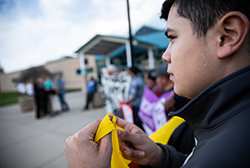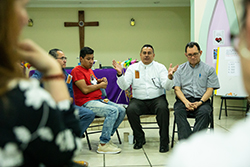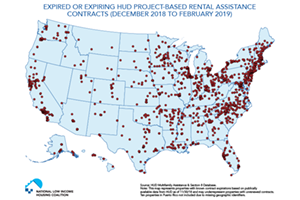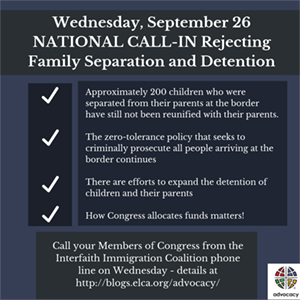Congress traditionally takes a recess during the month of August, allowing lawmakers time to return to their home states and congressional districts to connect with constituents. That may look a bit different this year, but the month still holds meaningful potential for local advocates to advance relationships and engage with elected officials, ask questions and share concerns.
New to help you connect with lawmakers in 2020 is a Virtual Visits resource with tips on how to utilize digital communications options more widely in use this year. Our August Recess Guide also contains ideas for communicating with your elected officials and candidates in–district this month.
Here are some timely questions and talking points based upon ELCA Advocacy priorities.
THIS MOMENT IN TIME: Hunger
![]() “Because of sin we fall short of these obligations in this world, but we live in light of God’s promised future that ultimately there will be no hunger and injustice. This promise makes us restless with less than what God intends for the world.” – from ELCA social statement Sufficient Sustainable Livelihood for All
“Because of sin we fall short of these obligations in this world, but we live in light of God’s promised future that ultimately there will be no hunger and injustice. This promise makes us restless with less than what God intends for the world.” – from ELCA social statement Sufficient Sustainable Livelihood for All
REMARKS
As impacts of the coronavirus pandemic cascade, ministry demands expand and more workers are left without employment. Our role to care for our community and each other is more valuable than ever. Hunger and lack of access to healthy and nutritious food are devasting and can also make communities even more vulnerable to COVID-19.
With unemployment at a record high and schools closed, the Supplemental Nutrition Assistance Program (SNAP) needs to be expanded so that individuals and households can get enough to eat. This includes increasing SNAP benefits by 15%, increasing the minimum monthly SNAP benefit from $16 to $30 and suspending all administrative SNAP rule changes indefinitely, during this time of economic distress and long-term recovery.
QUESTIONS
- What exactly do you support in additional federal response for the U.S. to stop the virus and the health and economic disparities that are so present in our communities?
- Will you support a temporary increase in SNAP benefits to provide food to hungry people?
THIS MOMENT IN TIME: Police Reform
![]() “As persons called to love one another as God has loved us, we therefore proclaim our commitment to speak with one voice against racism and white supremacy. We stand with those who are targets of racist ideologies and actions. With them, we demand and will advocate for a more just, loving, and peaceful world where the gifts of all people are appreciated, and the lives of all people are treasured.” – From ELCA social policy resolution “Condemnation of White Supremacy and Racist Rhetoric”
“As persons called to love one another as God has loved us, we therefore proclaim our commitment to speak with one voice against racism and white supremacy. We stand with those who are targets of racist ideologies and actions. With them, we demand and will advocate for a more just, loving, and peaceful world where the gifts of all people are appreciated, and the lives of all people are treasured.” – From ELCA social policy resolution “Condemnation of White Supremacy and Racist Rhetoric”
REMARKS
The discrimination and violence experienced by black and brown Americans at the hands of law enforcement is again at the forefront of our nation’s awareness and concern. We need Congress to advance meaningful legislation to protect Black communities from the systemic perils of over-policing, police brutality, misconduct, and harassment, and end the impunity with which officers operate in taking the lives of Black people. Congress must act with bipartisan urgency toward a just society that treasures the lives of all, including changes in policing policy and practices.
Eight legislative measures “to ensure that police officers live up to their oath to protect and serve” were identified by over 400 organizations including the ELCA in a June 1 letter to congressional leaders. There are federal actions that could have impact.
QUESTIONS
- What are you hearing from constituents about the need for policing reform?
- What policing reform policies do you support and why?
THIS MOMENT IN TIME: Housing and Homelessness
![]() “God’s love in Jesus Christ does, however, move us to care for homeless people as God cares for all. Christians who have shelter are called to care, called to walk with homeless people in their struggle for a more fulfilling life and for adequate, affordable, and sustainable housing.” – From ELCA social message “Homelessness: A Renewal of Commitment“
“God’s love in Jesus Christ does, however, move us to care for homeless people as God cares for all. Christians who have shelter are called to care, called to walk with homeless people in their struggle for a more fulfilling life and for adequate, affordable, and sustainable housing.” – From ELCA social message “Homelessness: A Renewal of Commitment“
REMARKS
The COVID-19 pandemic and its economic repercussions has exacerbated many inequalities in our communities, including access to housing, the risk of eviction and homelessness. Many houses of worship and religious service agencies are involved in sheltering and lifting up our neighbors without homes and would like to see greater investment in and focus on affordable housing.
Exorbitant housing costs have been a growing crisis long before the pandemic, with nearly 71% of extremely low-income renters paying over half their incomes on housing needs. Black and brown individuals are more likely to be renters or at risk of housing insecurity than their white counterparts, making an equitable housing response a significant matter of racial justice as well. Skyrocketing housing costs force many to decide between paying for food or settling their other bills, leaving many with the constant threat of eviction and losing their home.
QUESTION
- With enough resolve, we have the means to end homelessness and close racial housing divisions in our communities. As a national leader, how will you work to make access to housing programs a top priority in Congress and in our national responses to crisis?
THIS MOMENT IN TIME: Migration
![]() “Concern for the well-being of others lies at the very heart of Christian faith. Christians have a variety of social identifications through their nation of origin, race, ethnicity or political affiliation, but all Christians have a common identity as children of a loving creator…” – From ELCA social message “Human Rights“
“Concern for the well-being of others lies at the very heart of Christian faith. Christians have a variety of social identifications through their nation of origin, race, ethnicity or political affiliation, but all Christians have a common identity as children of a loving creator…” – From ELCA social message “Human Rights“
REMARKS
In June, the Administration issued a new rule that would severely restrict access to asylum to the U.S. In addition, the Administration is also in the middle of litigation to keep asylum-seeking mothers in detention. We know community-based alternatives to detention is humane and keep everyone’s health as a top priority and that making efforts to address the issues that force many to flee is a better long-term strategy. All of these efforts are putting the wellbeing of people seeking protection at risk. The U.N. High Commissioner for Refugees reported that a blanket measure to restrict asylum seekers and refugees on the basis of public health does not meet international standards and many public health experts also report that there is no public health rationale for effectively ending asylum. Welcoming people seeking safety in our country is faithful work for me and my community.
QUESTIONS
- As a member of an influential member of our leadership, how are you making sure the U.S. is honoring international laws and standards in our asylum policy?
- How are you supporting legislation that makes our asylum system both safer and more accessible for those seeking protection?
- How are you ensuring that families are not kept in detention or separated in the process of seeking safety in the U.S.?
THIS MOMENT IN TIME: International Aid
![]() “Healing is restoration of wholeness and unity of body, mind, and spirit. Healing addresses the suffering caused by the disruption of relationships with God, with our neighbors, and with ourselves.” Lutherans can “inform themselves of global health concerns and support global ministries of health.” – from the ELCA social statement Caring for Health: Our Shared Endeavor
“Healing is restoration of wholeness and unity of body, mind, and spirit. Healing addresses the suffering caused by the disruption of relationships with God, with our neighbors, and with ourselves.” Lutherans can “inform themselves of global health concerns and support global ministries of health.” – from the ELCA social statement Caring for Health: Our Shared Endeavor
REMARKS
The U.S. has a rich history of providing humanitarian and development assistance to countries that are
experiencing humanitarian emergencies and extreme poverty. For example, through these programs the U.S. government is able to provide treatment for HIV/AIDS, Tuberculosis, and Malaria, address issues of food insecurity and malnutrition, and provide care for mothers and children. Millions of lives have been saved over the years because of U.S. support. But we cannot stop here now. This work must continue, especially because more people need assistance due to global instability and ever-increasing humanitarian crises.
The International Affairs budget constitutes just one percent of the federal budget. With so many diverse and complex challenges, we must protect and sustain our development and humanitarian programs to avoid more costly interventions in the future.
We know that even short bouts of hunger and malnutrition in the critical 1,000 days between a woman’s pregnancy and her child’s second birthday can lead to needless death and can have devastating lifelong consequences for children who survive – reducing their overall health, learning ability and earning potential.
QUESTIONS
- How important do you think it is to provide foreign assistance to low-income countries?
- What would you do to address global health challenges such as Ebola, TB, HIV/AIDS and malaria?
THIS MOMENT IN TIME: Interconnectivity and inequality when promoting next steps
![]() “We will examine how environmental damage is influenced by racism, sexism, and classism, and how the environmental crisis in turn exacerbates racial, gender, and class discrimination.” – From ELCA social statement Caring for Creation
“We will examine how environmental damage is influenced by racism, sexism, and classism, and how the environmental crisis in turn exacerbates racial, gender, and class discrimination.” – From ELCA social statement Caring for Creation
REMARKS
The COVID-19 pandemic exposed the weaknesses in the U.S. economic, health, and food systems. People of color and people with low wealth are more likely to contract COVID-19, with the death rate among the American Black population being greater than any other ethnic group within the United States. Though not conclusive, a recent American University study appears to make a connection between air pollution and increased rates of COVID-19. People of color are more likely to live in areas where air, water and soil pollutions are more prevalent. The CDC states: “Long-standing systemic health and social inequities have put many people from racial and ethnic minority groups at increased risk of getting sick and dying from COVID-19.”
The interconnectivity of race, environment, economic, health and food are particularly glaring currently. Numerous bills have been introduced separately in Congress including the most recent Economic Justice Act whose summary states: “Federal underinvestment in communities of color has created systemic disparities that cross nearly every sector…”
QUESTIONS
- How does Congress come together in a bipartisan manner in these most challenging times to make concrete steps to pass bipartisan legislation to begin to address the injustices that have been perpetrated against people of color?
- What actions do you need to see from constituents to make this a priority at the highest level?
Reach out to your ELCA state public policy offices in more than 19 states or to the ELCA Advocacy national office at washingtonoffice@elca.org. We are available to answer your questions and aid you in the process. Please send an In-district Activity Form if you meet with policy makers locally to help us build upon and strengthen one another’s efforts.
Your question can spark an important conversation and provides an opportunity to hold your elected official publicly accountable. Thank you for your advocacy in service to your neighbor!









